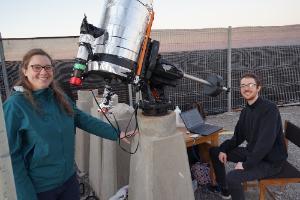CfAI news and events
Amrit Nayak wins Keith Nicholas Prize for 2025
Congratulations to Amrit Nayak for winning the Physics Department's Keith Nicholas Prize for 2025. This prize is awarded to a postgraduate student for their outstanding overall performance in Physics.
Over the last three years with us, Amrit has contributed to building the Cherenkov Telescope Array and has used the Fermi-LAT gamma-ray satellite to study the most energetic solar flares. The enthusiasm and dedication with which he has pursued his PhD studies have produced some outstanding results and bode well for the future.
Space 2075: Royal Society perspective launch
Durham University Space Research Centre were invited to attend and exhibit at the launch of the Royal Society Space 2075 perspective.
CfAI Professor James Osborn was a reviewer of the document.
Congratulations to the authors and to the Royal Society team who pulled it together.
The exhibition showcased early-stage technologies from UK universities, and talks were a combination of insightful visions of the future (positive and negative) and lessons learnt from the past.
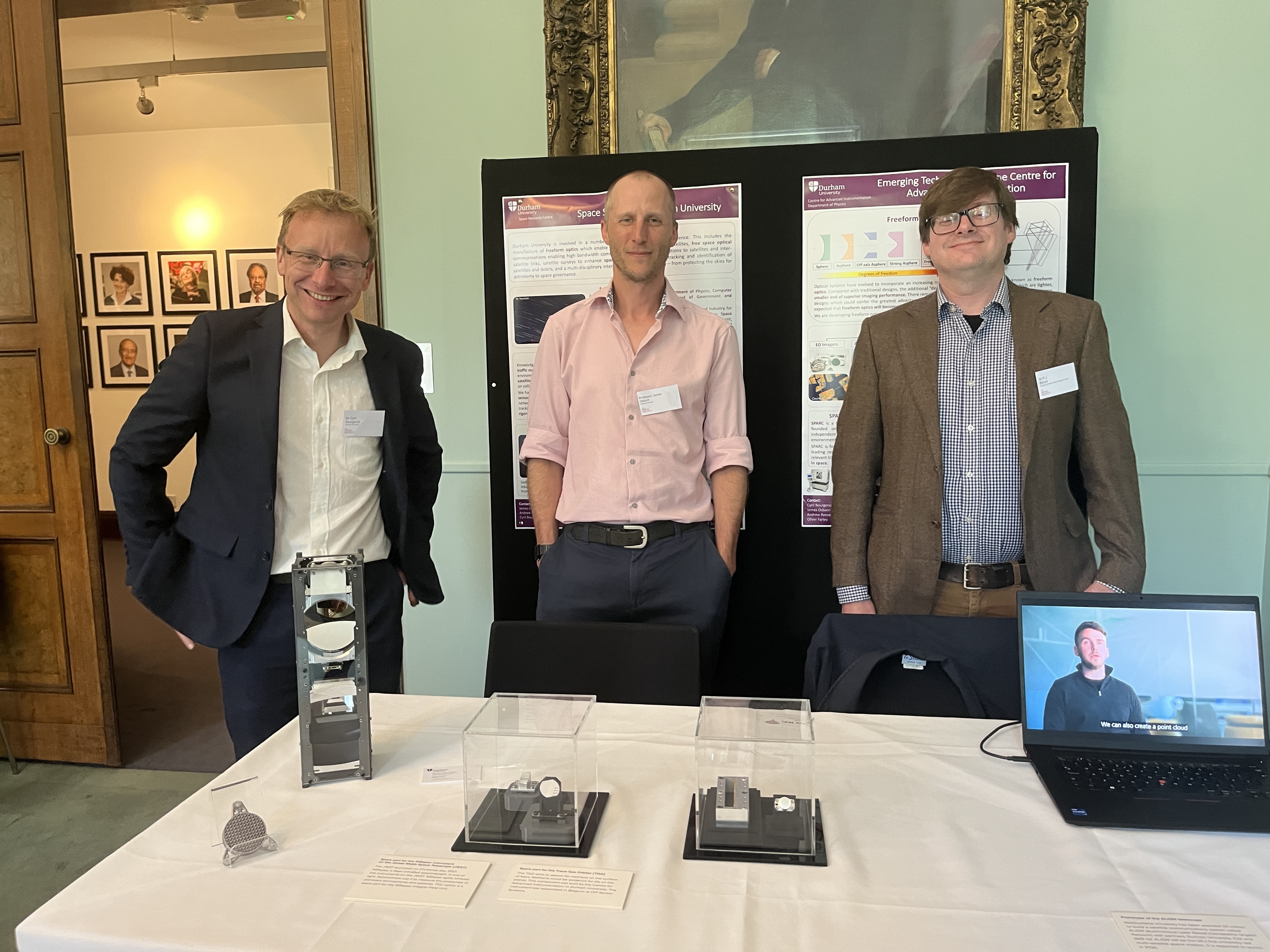
Kathryn Barrett is awarded the Ella Bryant Prize for Physics
The Ella Bryant Prize for Physics is awarded to a postgraduate student on the basis of outstanding performance and citizenship. Kathryn has made an excellent start to her PhD, demonstrating high-level of achievement, and commitment to the department. She has engaged professionally and actively with external stakeholders to develop future research opportunities for herself and the wider group. She is currently both the EDI and PG representative of respective departmental committees. She has participated in developing and delivering outreach activities. She has also become involved in ESTRELLAS women in STEM event, chairing one of the sessions. Kathryn is an excellent researcher and an asset to the group and department.

Congratulations to the BlueMUSE team on their concept review
We want to thank the amazing international BlueMUSE team who are in the process of finishing up their concept review with ESO. BlueMUSE (https://bluemuse.univ-lyon1.fr) will be a optical seeing-limited, blue-optimised, medium spectral resolution, panoramic integral-field-spectrograph. When finished, BlueMUSE will be installed on one of the VLT telescopes on Cerro Paranal (Chile). Scientifically, it will survey large sample of massive stars in our galaxy and the Local Group, study ionised nebulae, starburst and low surface-brightness galaxies. At high redshift, it will allow us for the first time to detect the IGM unambiguously in emission, as well as study the evolution of the CGM properties near the peak of the Cosmic Star formation history.
The Durham team were in charge of the mechanical design of the spectrograph (see the image below), which passed with flying colours. Now on to the preliminary design phase where Durham will be in change of the spectrograph and IFU development.
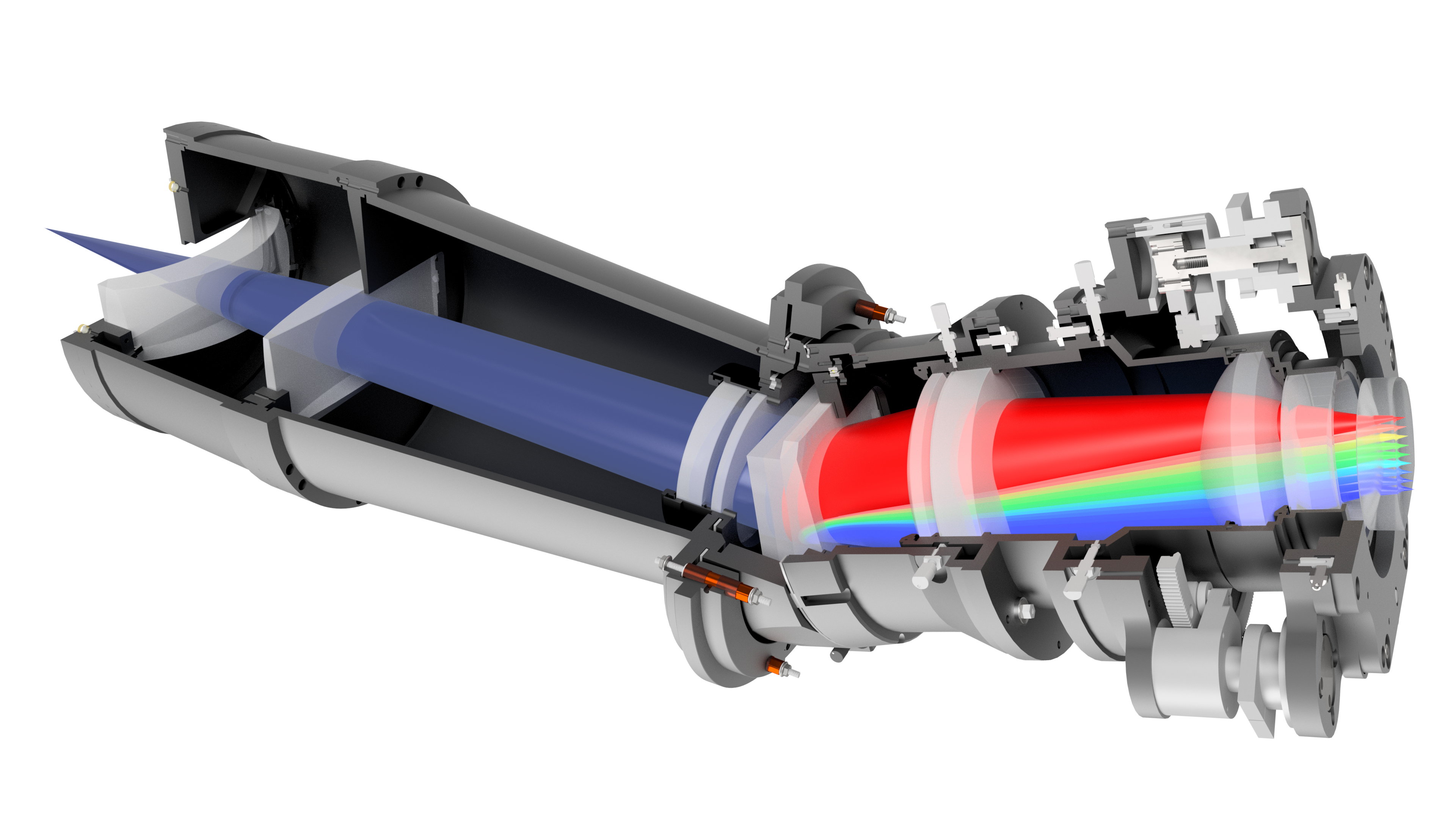
OTTER: Exploiting Optical Turbulence as Part of a Climate Tipping Point Early Warning System
CfAI researcher, Ollie Farley, has been awarded funding from ARIA: Forecasting Tipping Points. Backed by £81m, this programme aims to enhance our climate change response by developing an early warning system for tipping points.
His project, OTTER: Exploiting Optical Turbulence as Part of a Climate Tipping Point Early Warning System, aims to develop a new instrument which will employ a low SWaP-C drone-based laser transmitter and ground-based receiver unit to measure path-resolved properties of turbulence in the atmospheric boundary layer. This turbulence is associated with surface to atmosphere heat fluxes that are crucial to the accurate modelling of ice sheet melt rates and subsurface ocean currents. Using OTTER, the team will look to unlock a step-change in our understanding of this turbulent environment, and greatly improve both the quality and quantity of data available to model climate tipping points.
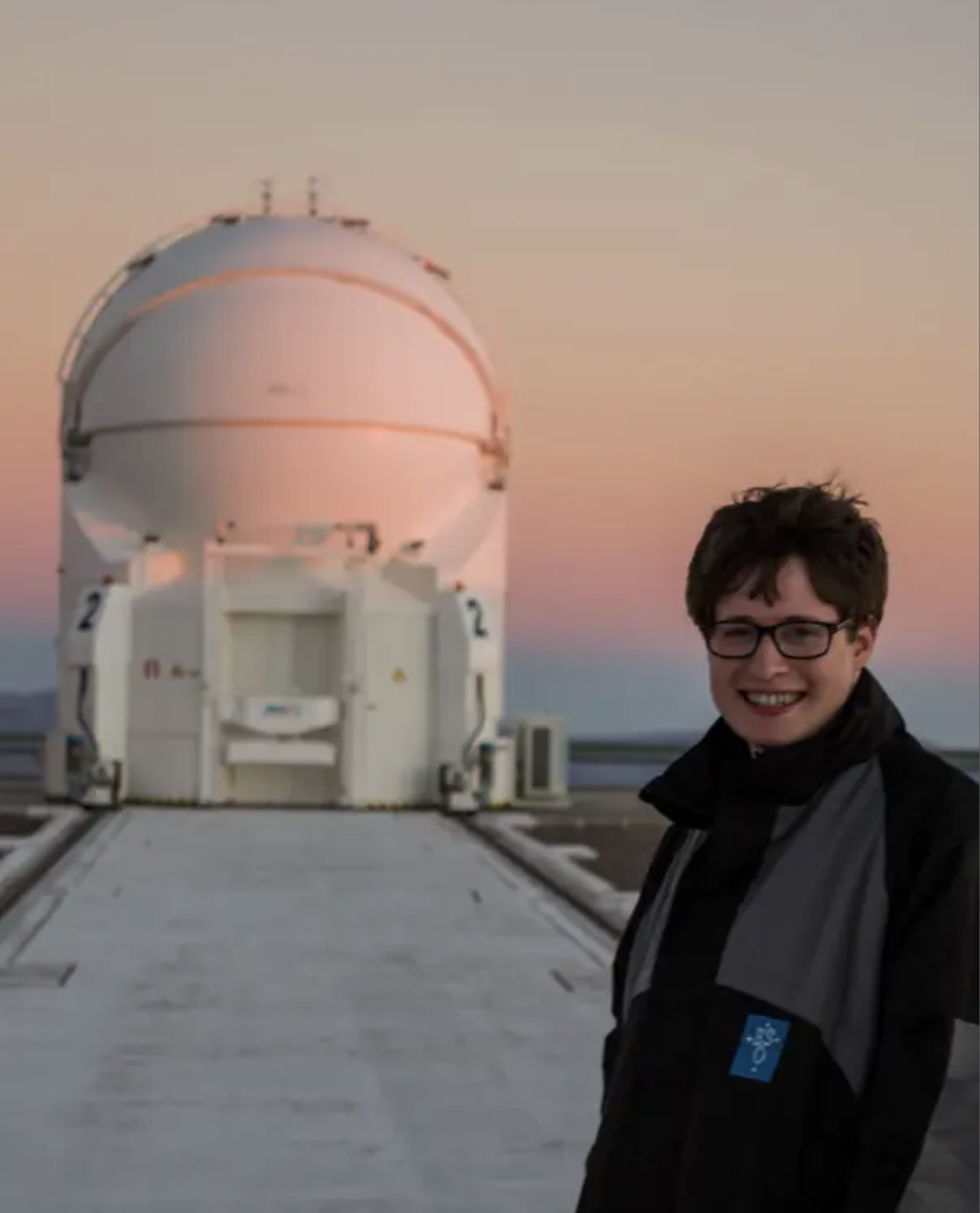
Ariadna Calcines Rosario receives the ENDECAN Award to the Scientific and Technological Talent
On the eleventh of December, ENDESA Spain celebrated their ENDECAN Award ceremony in Tenerife. These awards recognise talents from the Canary Islands in multiple disciplines, such as: sustainability, biodiversity, solidarity, sports or culture.
Ariadna Calcines Rosario received the ENDECAN Award to the Scientific and Technological Talent for her professional career on the design and development of the image slicer technology for astronomy, her main research line at the Centre for Advanced Instrumentation at Durham University.
The ceremony included a panel discussion where she presented LUCES, a project funded by the UK Space Agency that she leads in collaboration with UCL to develop the image slicer technology beyond the current technology limits for applications in the Extreme Ultra-Violet regime for the next generation of solar space missions.
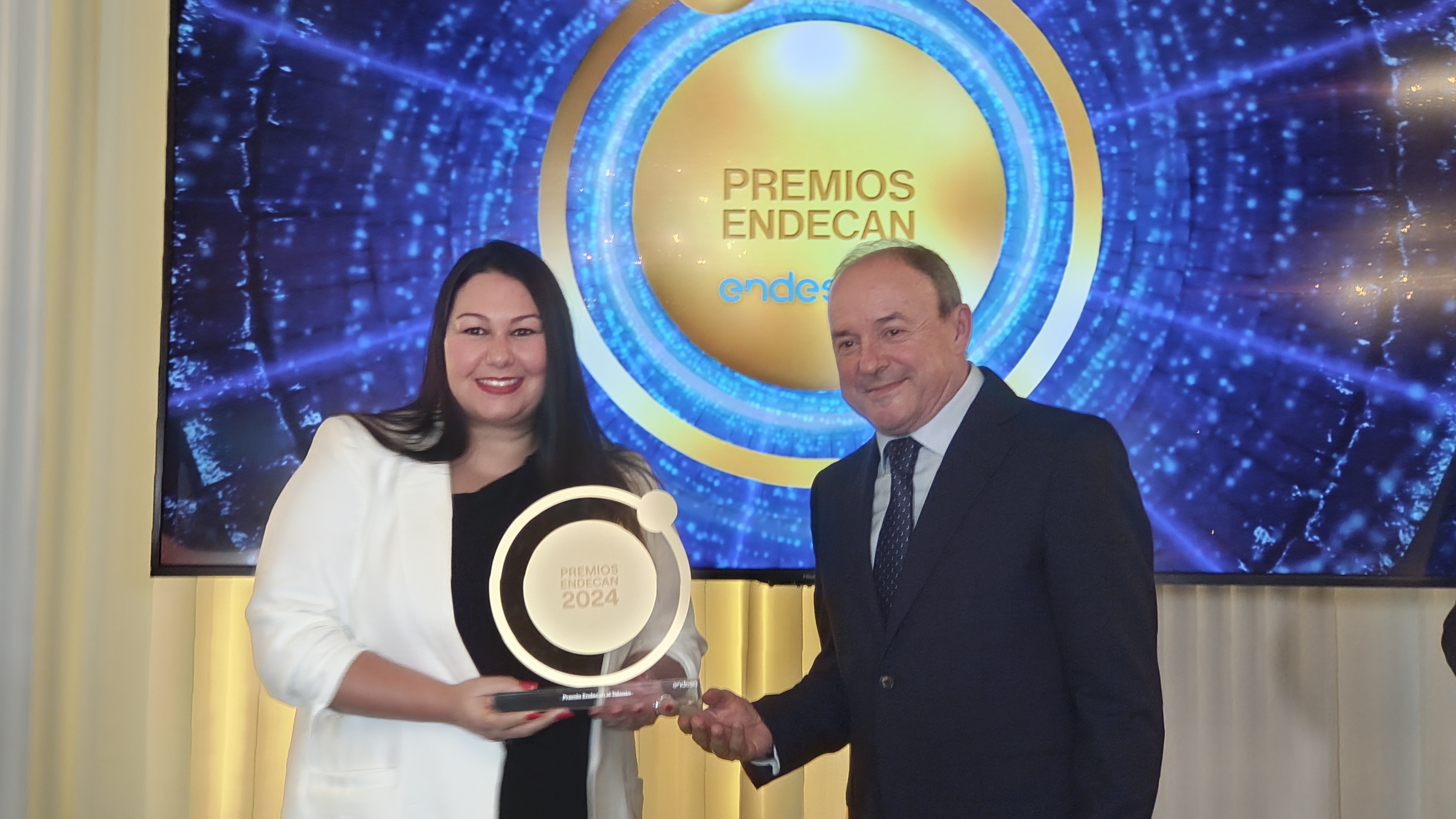
Ariadna Calcines Rosario receiving the ENDECAN Award to the Scientific and Technological Talent by the General Director of ENDESA, Spain.
The Day the Satellites Stood Still
Prof. James Osborn was invited to present at the Durham Bright Ideas Gathering.
"The day the satellites stood still", a story exploring the everyday reliance on satellites and space data.
What would happen if we woke up one day and all the satellites had turned off? What events could lead to this scenario and how are researchers in Durham University Space Research Centre working to mitigate the risk.
What do you think? Did he get it about right? What did he forget?

CfAI participates in ICSO
Chris Graham, Perrine Lognone, Ollie Farley and Ariadna Calcines Rosario, from CfAI, participated in the International Conference on Space Optics celebrated in The Antibes in October 21st-25th. CfAI presented a wide range of research topics, including: folded Three Mirror Anastigmat telescope for Earth Observation CubeSat; unlocking Ground-to-Space optical links capacity with optimized AO pre-compensation using spatio-temporal measurements and priors; optimising optical ground station locations for satellite communications through atmospheric turbulence with Adaptive Optics mitigation and developing the Image Slicer technology for space applications in the EUV.
World Space Week
Researchers from Durham University’s Centre for Advanced Instrumentation Group were at the Centre for Life in Newcastle on Saturday, 5th October, for World Space Week to present an experiment on the theme “Space & Climate.” We brought gas lamps (Neon, Mercury, and Sodium), and children had the opportunity to use a spectrograph to break down the light and observe the different emission lines.
It was an excellent day for the team, with lots of questions about space and satellites—some quite unexpected—showing the interest and passion of the younger generation for Science and Technology.
Thank you, The Centre for Life, for inviting us and meet the local communities.
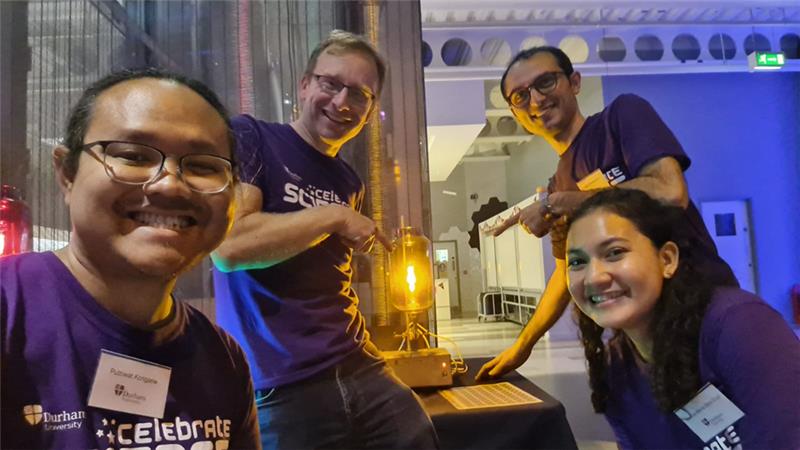
Advancing Metal Optics for Space Systems
The Enabling Technology Program (ETP1-040) research project, “Advancing Metal Optics for Space Systems,” funded by the UK Space Agency, is concluding at the end of this month.
The project's objective was to design, manufacture, and test a three-mirror telescope for Earth Observation, with each mirror featuring a freeform optical surface. Freeform means the mirrors lack rotational symmetry, which allowed the system to be more compact but also increased the complexity of manufacturing and testing.
The team, comprising partners from Diamond Light Source in Harwell and the Advanced Manufacturing Research Centre AMRC in Sheffield, successfully achieved most of the key objectives:
(i) successful testing of the telescope,
(ii) design and 3D printing of the telescope housing in AlSi35, an aluminium alloy known for its thermal properties,
(iii) development of a novel polishing technique using Ion Beam Figuring on Nickel, the material used for the mirrors.
The results of this project demonstrate that lightweight, space-grade housing with complex geometries can be realized through additive manufacturing, achieving significant weight reduction.
This project also acknowledges the valuable support and contributions from QED Technology and Schneider.
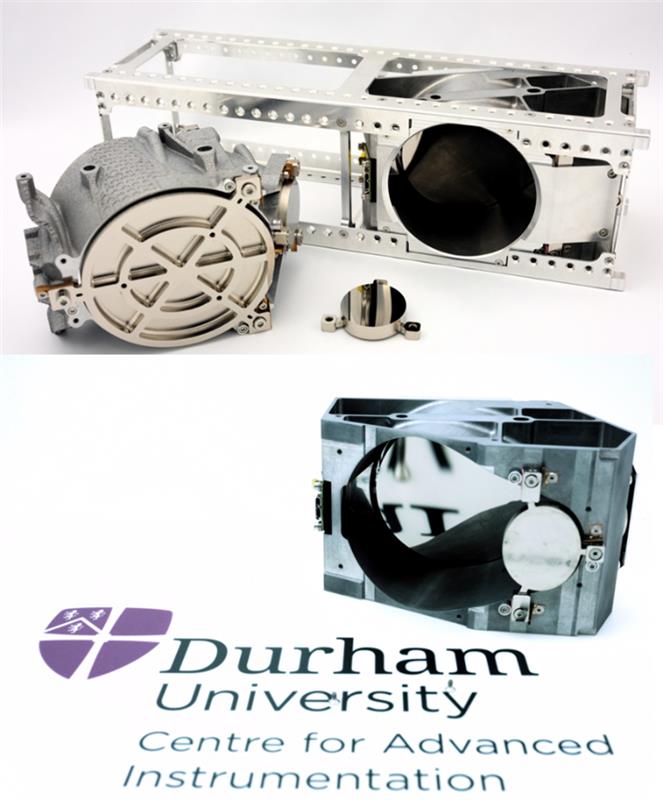
CfAI celebrates ESTRELLAS: Women in Tech & Sciences
Speakers from different countries told us about their impressive careers and their inspiring stories. A panel discussed actions that could be taken with the goal of working together towards gender equality.
ESTRELLAS dedicated a session to acknowledge all women in roles that support research, such as: managers, PSS support, technical support, science outreach, IAA, business, communications, pre-award, post-award and project support administrators. These roles are highly important for the development and success of all projects.
From ESTRELLAS we would like to encourage the power of supporting each other, treating everybody with respect, appreciating the efforts and contributions of everybody, providing more positive feedback and creating healthy work environments.
This event was funded by E.D.I. and IAA and organised by: Ariadna Calcines Rosario, Meryem Dag, Kathryn Barret, Lizzie Ranson, Rachel Murphy, Christina Munn, Lindsay Bell and Rebecca Scarr.
.jpg)
CfAI PhD poster celebration
On the 24th of July 2024 the PhD students did a great job producing posters and presenting them to members of the group. We thank everyone who took part and Claire for all her work organising.
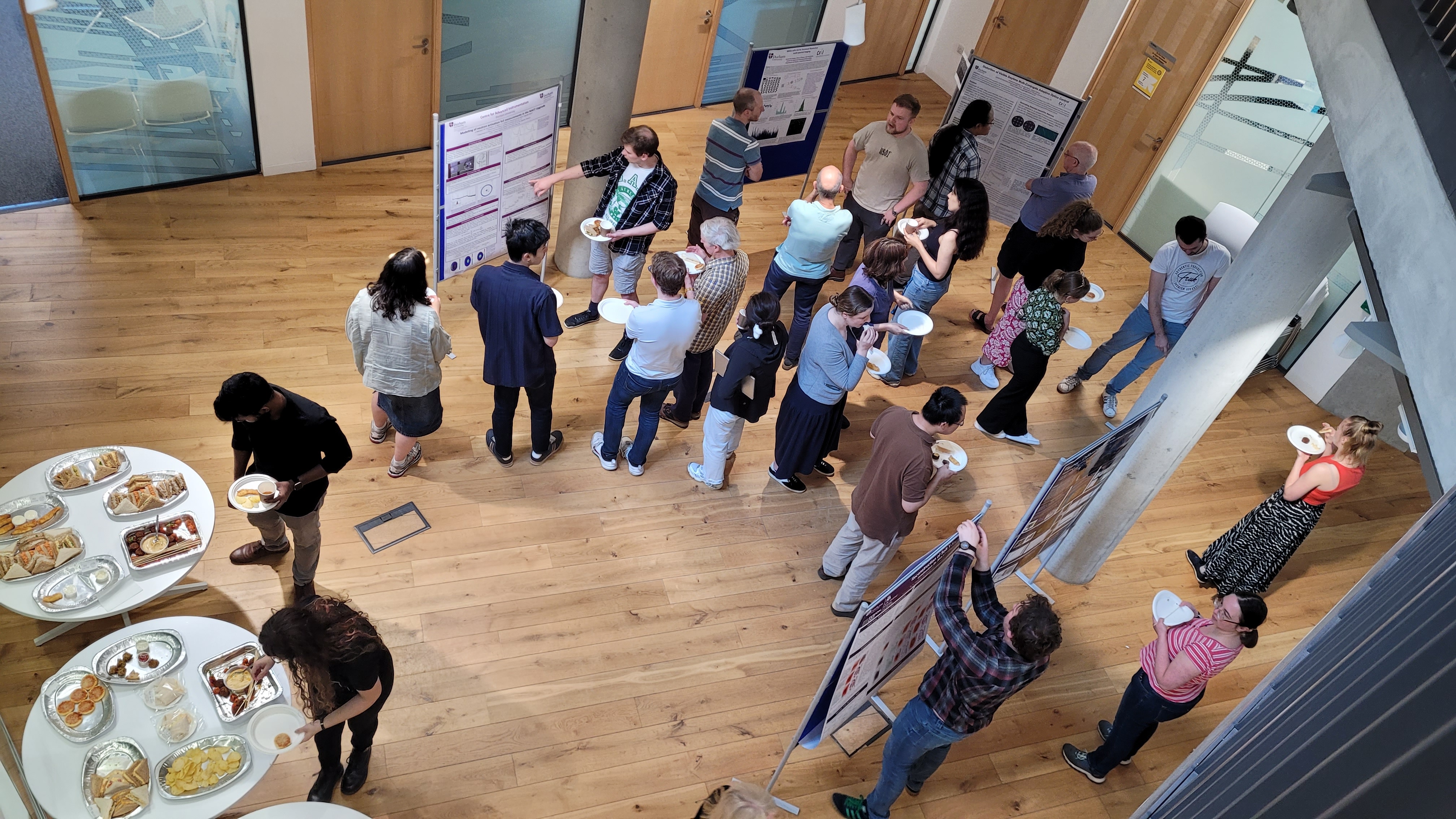
Little iLocater: paving the way for iLocater
The Little iLocater spectrograph (Lili) saw first light at the Large Binocular Telescope in Arizona on the 16th of May. We captured spectra of bright stars, allowing spectral characterisation with the iLocater front end for the first time. We used the powerful AO of the 8.4 m telescope to separate close in binaries (50 mas) and take spectra of the individual components that cannot be resolved normally.
Testing with Lili paves the way for the iLocater spectrograph, a high resolution spectrograph which will perform detailed characterisation of exoplanets in the near-infra red.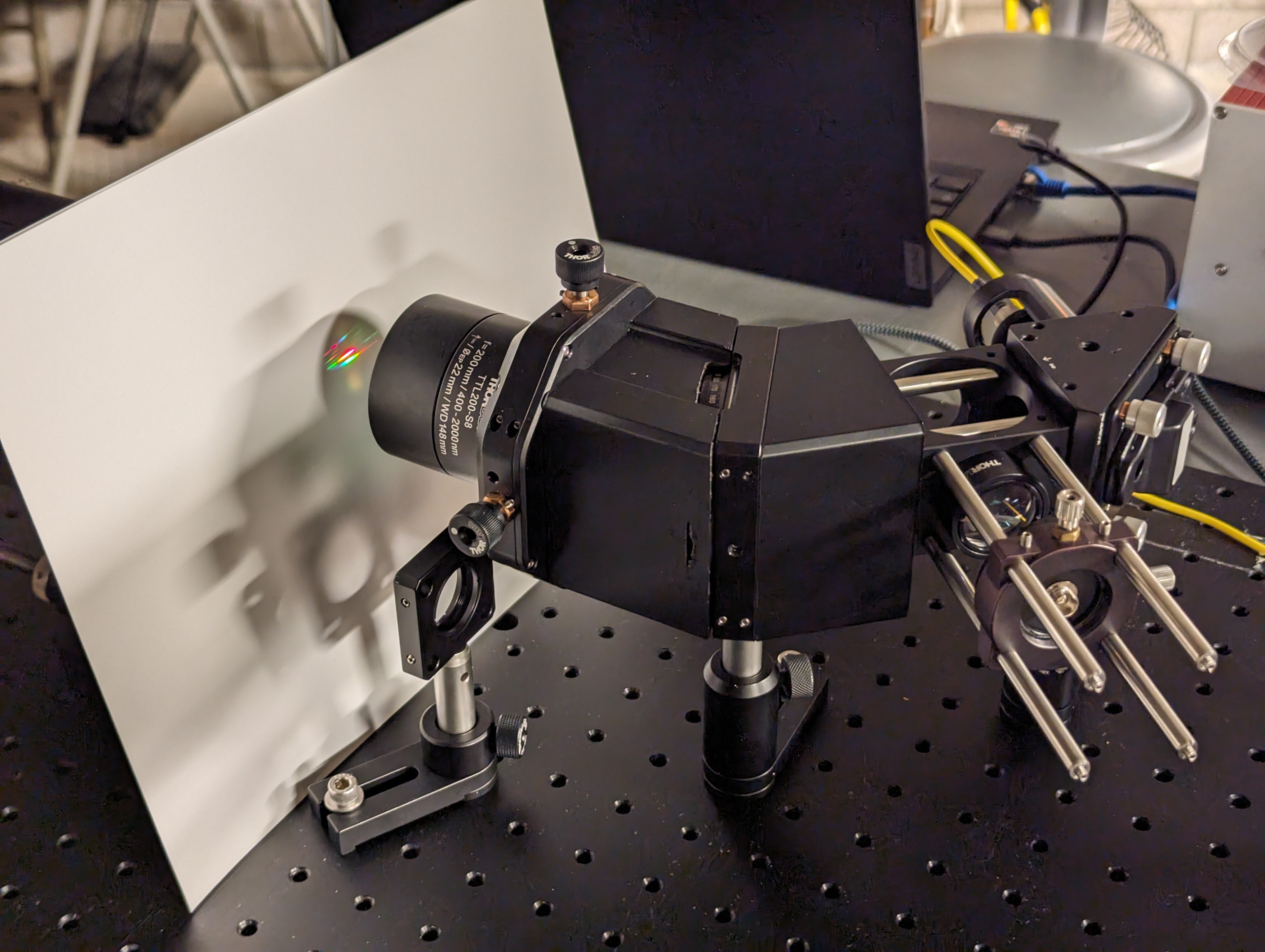 The Spectrograph
The Spectrograph
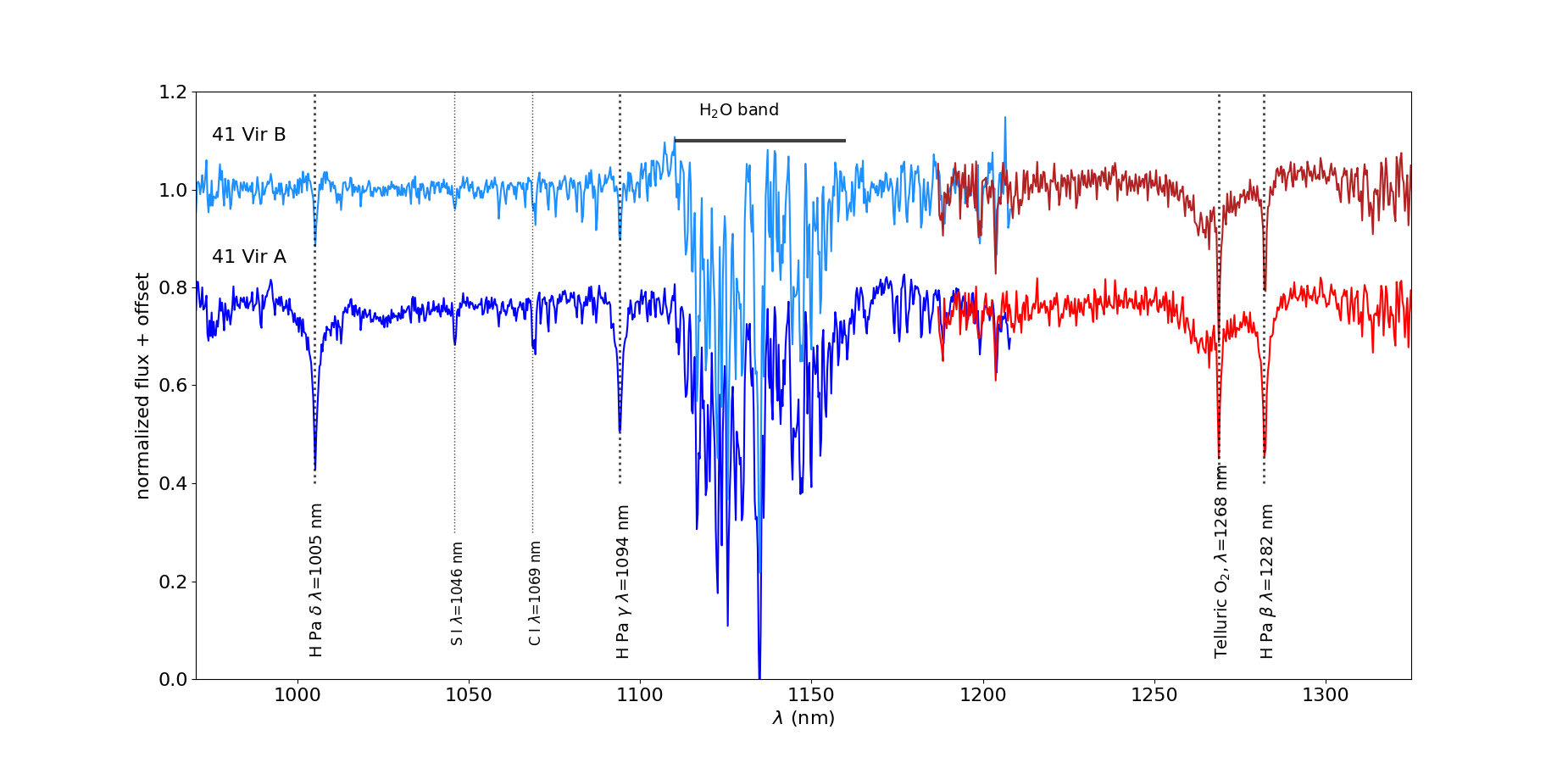 41 vir Binary system, with the components separated by 50mas
41 vir Binary system, with the components separated by 50mas
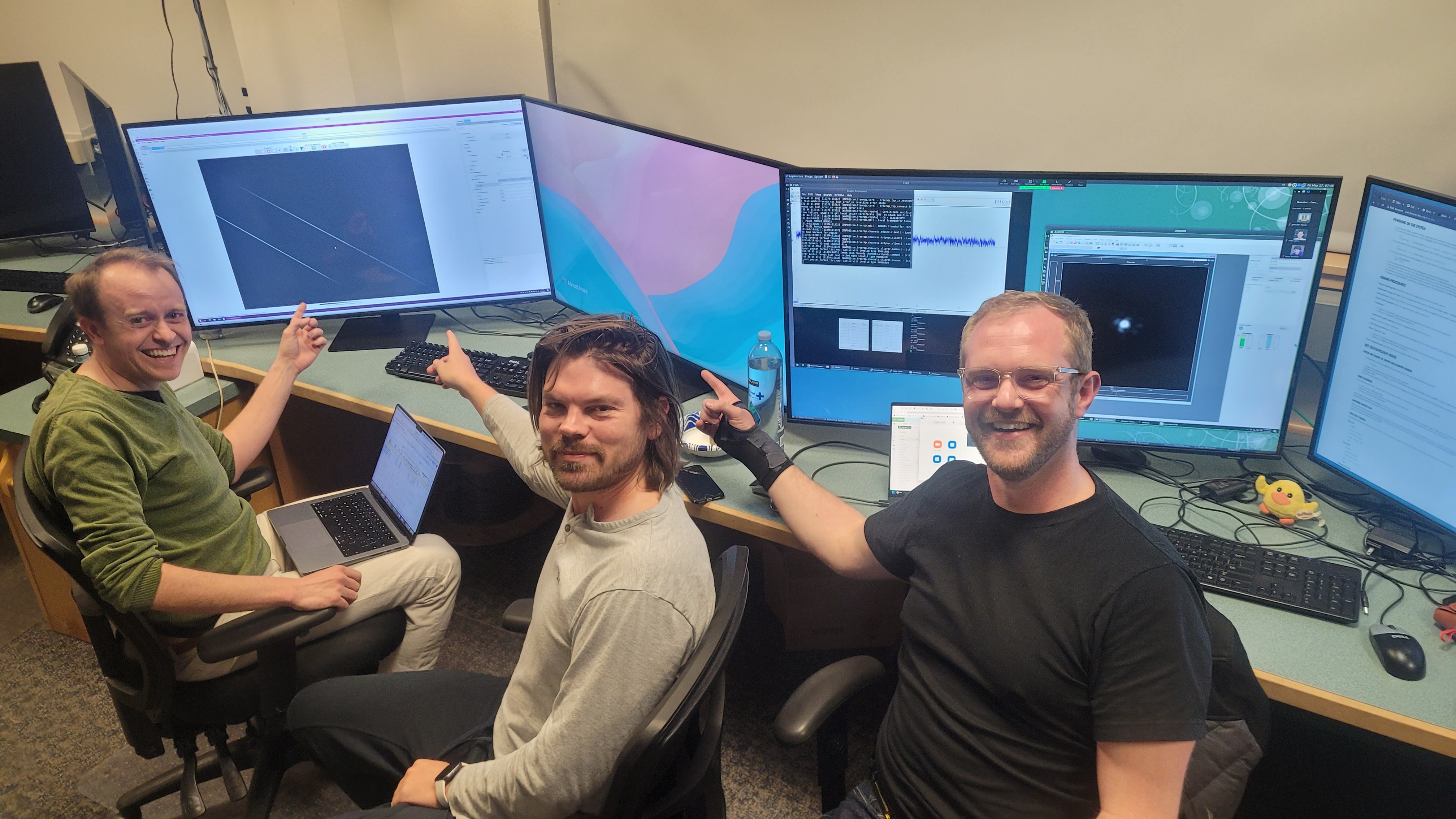
Wavefront Sensing in the VLT/ELT Era VIII Workshop
The Wavefront Sensing in the VLT/ELT Era VIII Workshop is being held this year at Durham University from the 23rd to the 25th to September. This workshop will be gathering of researchers in wavefront sensing for adaptive optics, covering these topics:
- High-Contrast Imaging (HCI)
- Hybrid and multi-stage
- Wavefront Sensing Extended objects
- Photonics and integrated optics
- Reconstruction methods & AI
- Wavefront Sensing needs for new applications (space debris, free space optics communications)
- Readiness of wavefront sensing for space-based observatories
- Laboratory and on sky demonstration of new designs and concepts
- Disturbances (water vapour, petals, segments, residual speckles)
We welcome all presentations related to announced and planned 3rd generation instruments for small, 8-10m, and ELT-class telescope instrumentation, alongside bench experiments and pathfinders.
Financial assistance is available to early career researchers to help cover the cost of travel and accommodation.
For more information and to register and submit an abstract, please visit the workshop website: https://wfs2024.sciencesconf.org/
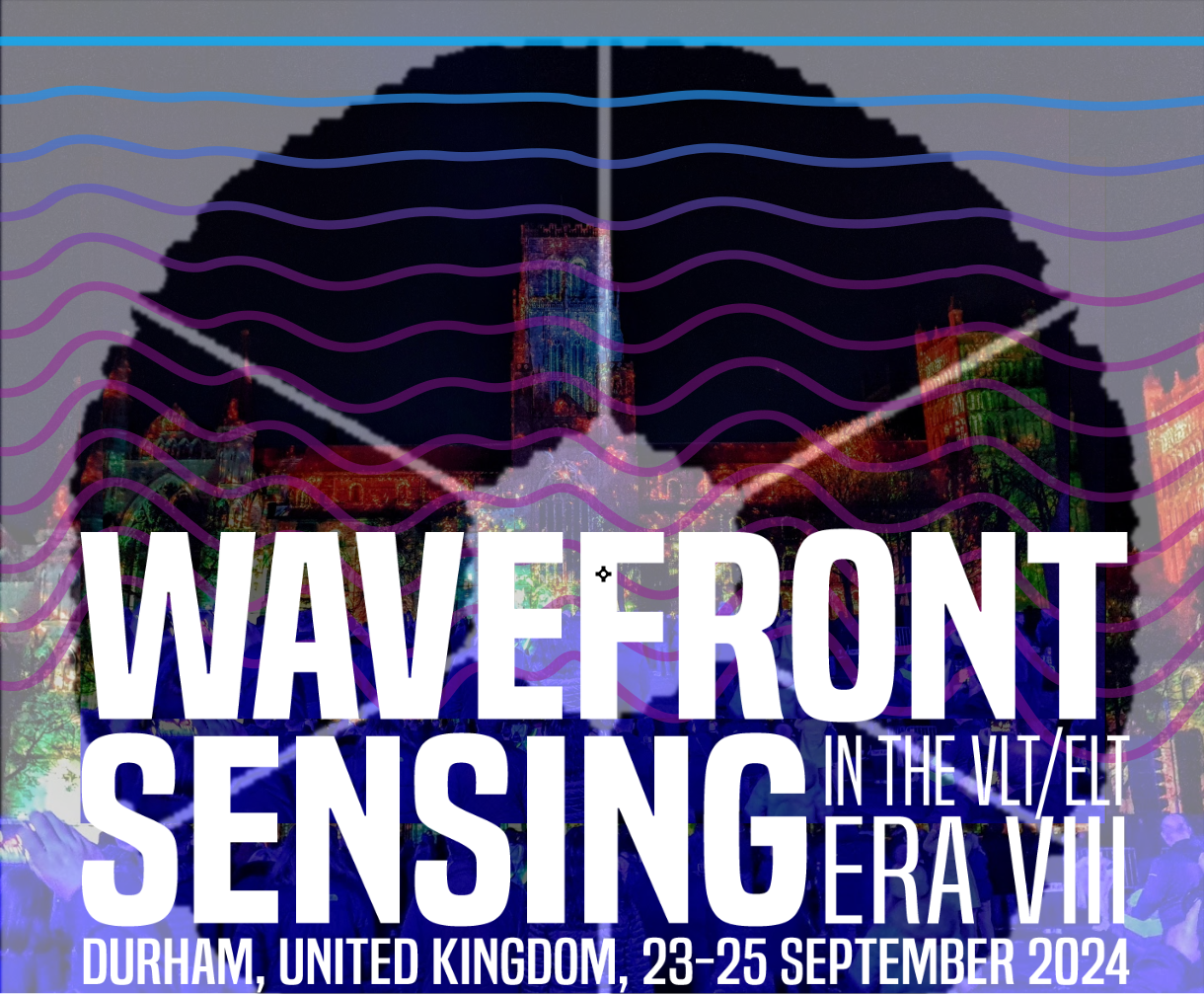
Ariadna Calcines Rosario Best Oral Presentation
Ariadna Calcines Rosario, CfAI Head of Optical Design, has received the Award to the Best Oral Presentation at the SPIE Astronomical Telescopes & Instrumentation Conference, Advances in Optical and Mechanical Technologies in Yokohama, Japan, presenting the latest developments in glass and metallic slicers.
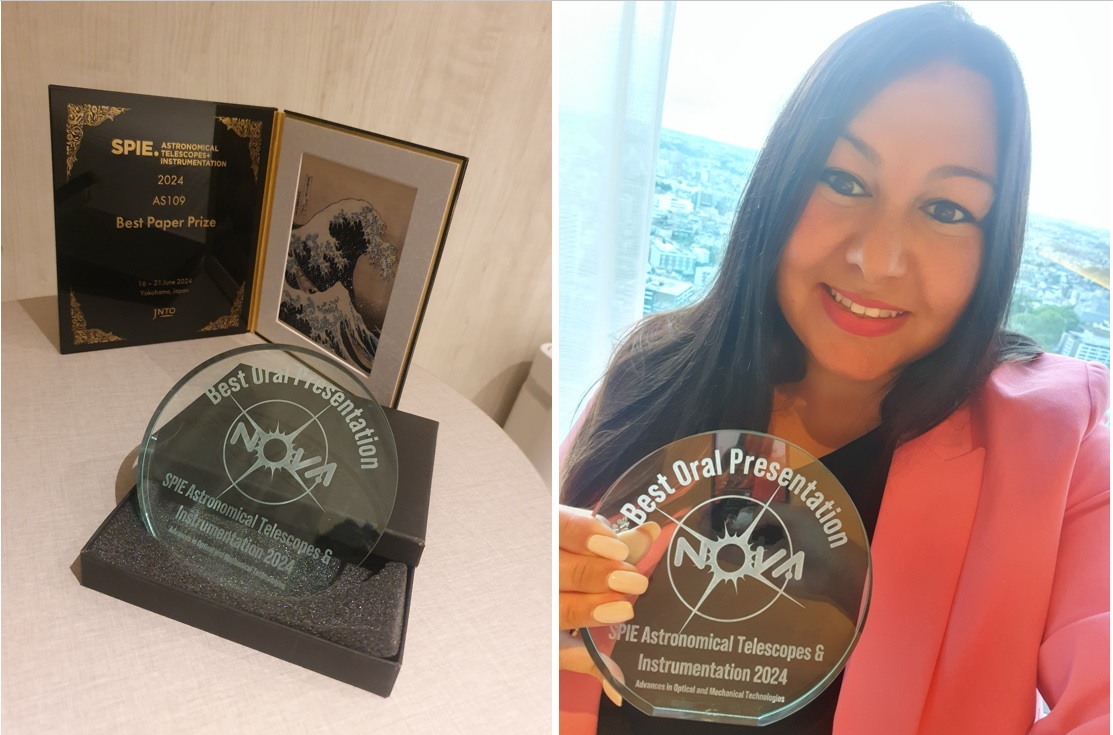
Space Optics Workshop 2024
We were delighted to welcome over 60 delegates to Durham University for our 'Space Optics: Systems and Applications' conference, organised and funded by our STFC Impact Acceleration Account and supported by our fantastic Durham University Business and Partnerships team.
The participants were a mix of academia, industry and research organisations, there was plenty of time for networking and invited talks from:
Christophe Buisset (ESA), Rory Evans (Oxford University), Carolyn Atkins, UKRI (ATC), Steven Knox (Surrey Satellite Technology), Cyril Bourgenot (Durham University) and Ann Fitzpatrick.
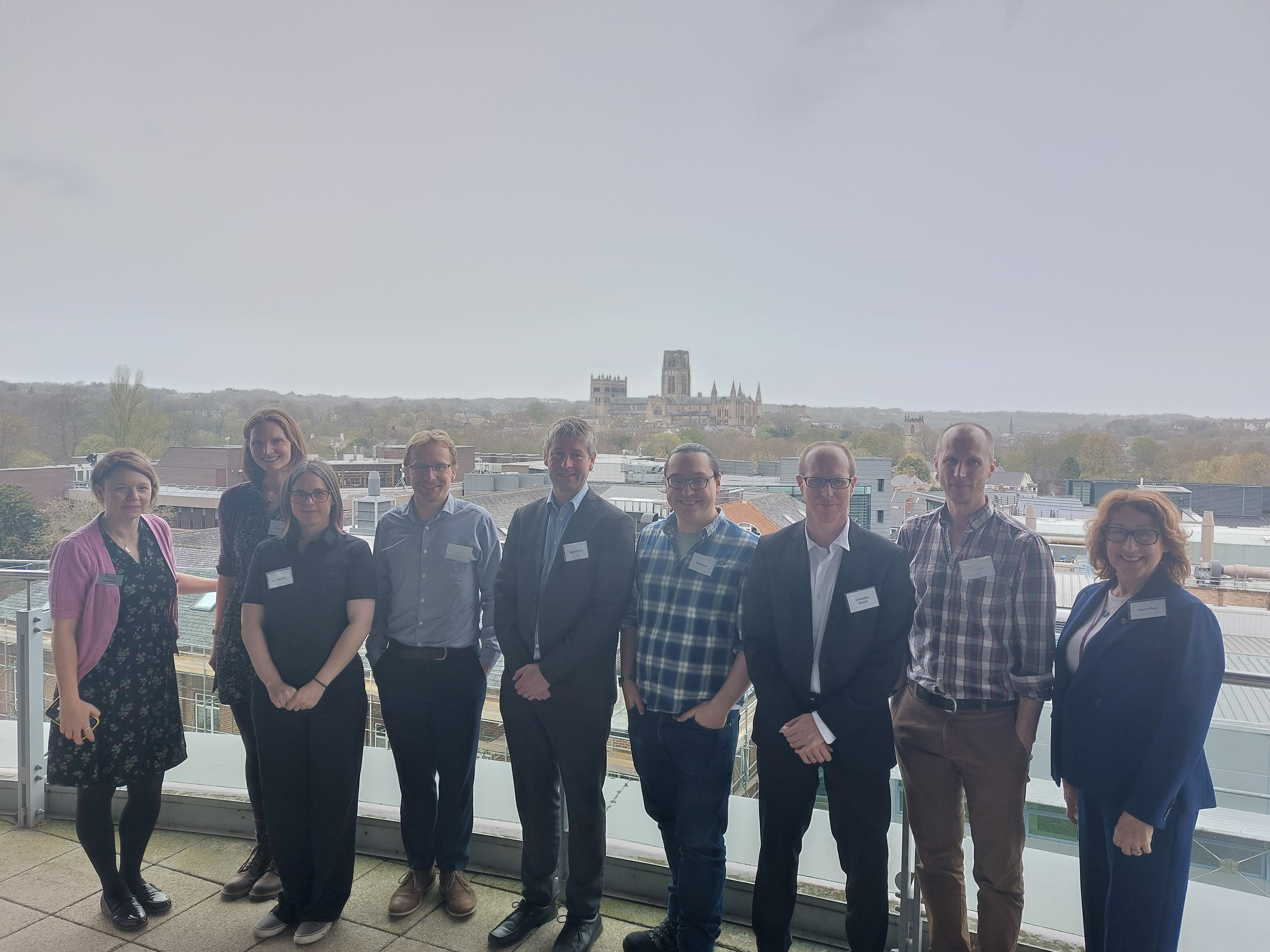
METIS Integral Field Unit for the Extremely Large Telescope
Today, we bid farewell to the METIS Integral Field Unit pupil mirror array, crafted from 28 meticulously designed slices and a composite planar fold mirror. This remarkable piece of engineering is now on its way to the UK Astronomical Technology Centre in Edinburgh, where it will undergo the final assembly process as a vital component of the METIS instrument at the focus of the Extremely Large Telescope.
METIS (Mid-infrared ELT Imager and Spectrograph) will be one of the first generation instruments for the 40m European Extremely Large Telescope (ELT). METIS is designed to be a workhorse for ground-based optical astronomy with science cases from objects in our Solar System to distant active galaxies and even probing the properties and atmospheric composition of planets orbiting distant stars.
The entire team has dedicated hours to shape this aluminium blank into a sophisticated marvel. A special shoutout to everyone involved in the metrology process, which required a highly specific setup to ensure the position measurement of each facet relative to the others.
We look forward to the significant contributions METIS will make to our understanding of the universe. Kudos to the team for their hard work and dedication in advancing astronomical technology!
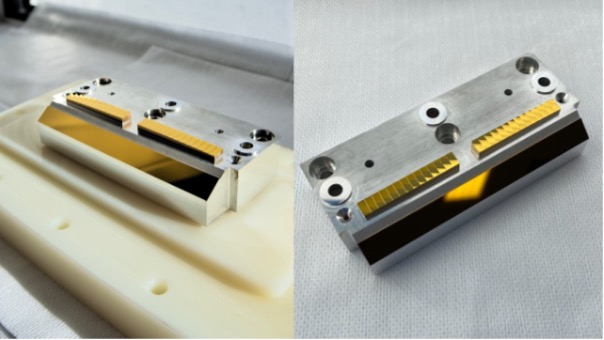
The Royal Astronomical Society has awarded the RAS Group Achievement Award 2024 to the team of the instrument MIRI for the JWST.
"Following the launch of JWST on December 25th 2021, the performance of MIRI has been spectacular, producing ground-breaking scientific results encompassing our own solar system, extrasolar planets, star formation in our own and nearby galaxies, and the properties of the most distant galaxies. These scientific achievements testify to the ambition, dedication and professionalism of Professors Wright and Rieke and of the entire MIRI Team. For these reasons the JWST-MIRI Team is awarded the 2024 Group Achievement Award (A) of the RAS."
MIRI was developed by a large international consortium, comprising many institutes in ten European countries and the United States, in partnership with ESA and NASA, including the CfAI in Durham University, and led by Professor Gillian Wright of the UK Astronomy Technology Centre and Professor George Rieke of the University of Arizona.
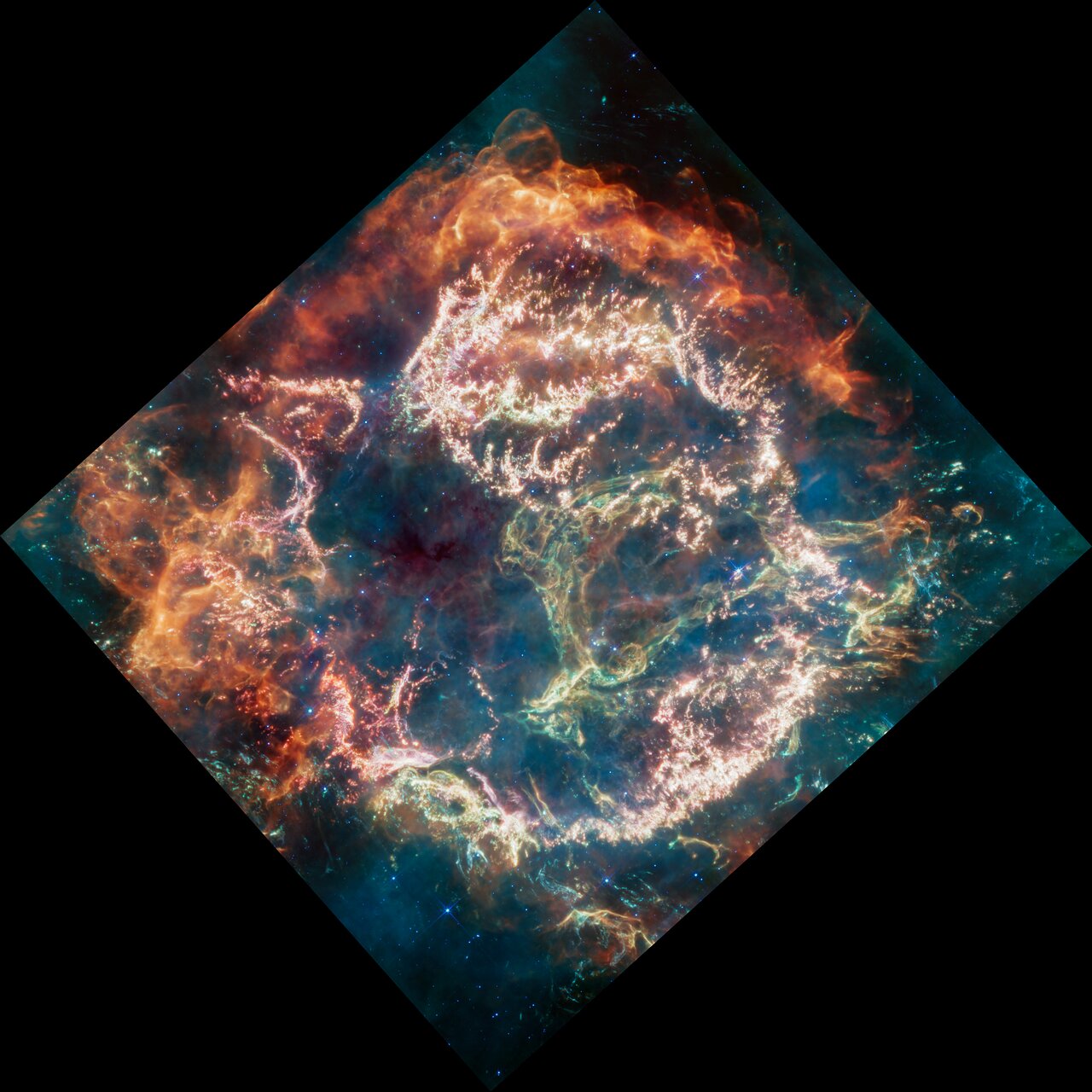
Cassiopeia A (Cas A) is a supernova remnant located about 11,000 light-years from Earth in the constellation Cassiopeia. It spans approximately 10 light-years. This new image uses data from Webb’s Mid-Infrared Instrument (MIRI) to reveal Cas A in a new light.
Credit: NASA, ESA, CSA, D. Milisavljevic (Purdue University), T. Temim (Princeton University), I. De Looze (UGent), J. DePasquale (STScI)
CfAI would like to welcome Dr. Robert J. Harris (Rob) back!
After doing his PhD in astrophotonics here at the CfAI he moved to Heidelberg Germany on a Zeiss fellowship. Here he also diversified his research interests, continuing his work in astrophotonics and also including work in 3D printing and helping develop MICADO, the first light imager and spectrograph for the Extremely Large Telescope. Now he’s back as an assistant professor we look forward to developing new integral field units, integrating state of the art 3d printing into our freeform optics and exploring new and exciting fields.

Spotlight on... Satellites
Our dedicated team of CfAI staff actively engaged in the 'Spotlight on... Satellites' event, hosted at the Centre for Life in the heart of Newcastle city on Saturday, October 7th. We showcased three captivating activities related to space and satellite instrumentation. Our demonstrations featured the remarkable Schlieren Imaging technique, allowing attendees to visualise atmospheric turbulence, as well as engaging on spectroscopy technique and instrumentation. Additionally, we introduced the fascinating world of telescopes.
We were delighted to inspire and captivate a young audience with the intricacies, challenges, and sheer excitement of satellite instrumentation. Witnessing the enthusiastic interest of so many young minds was truly rewarding.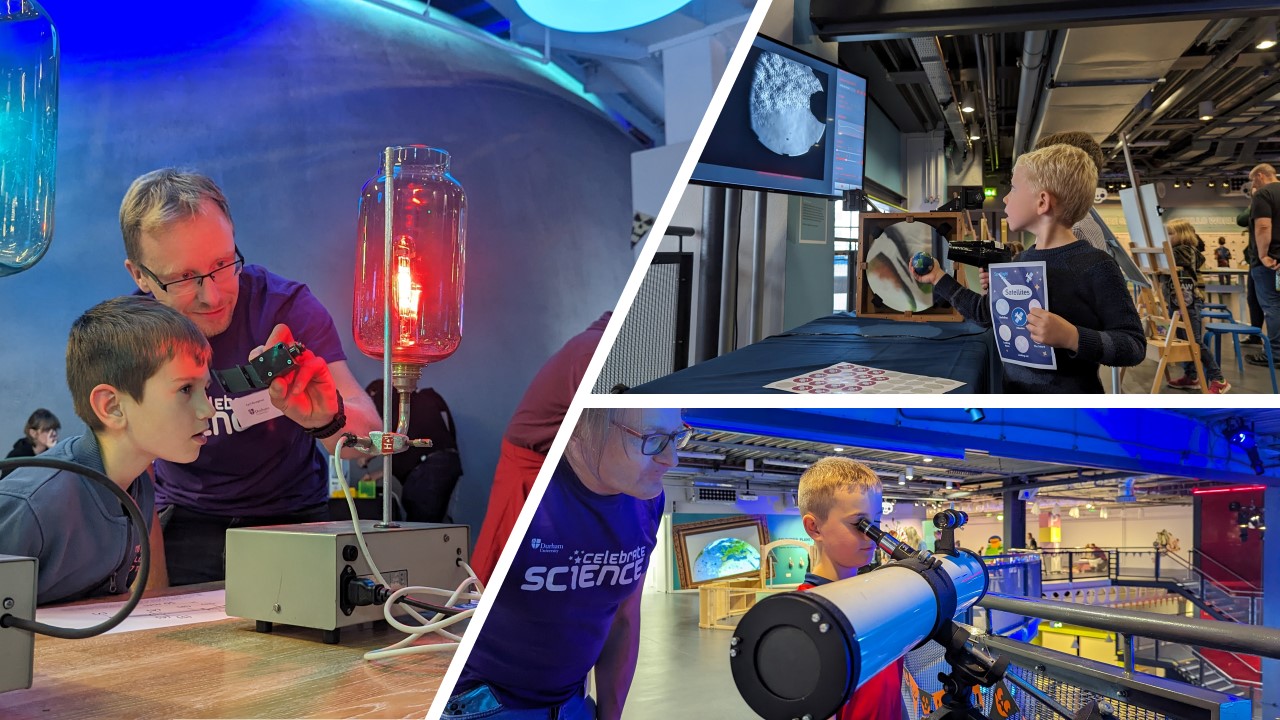
Space Applications in Science and Industry Summer School 2023
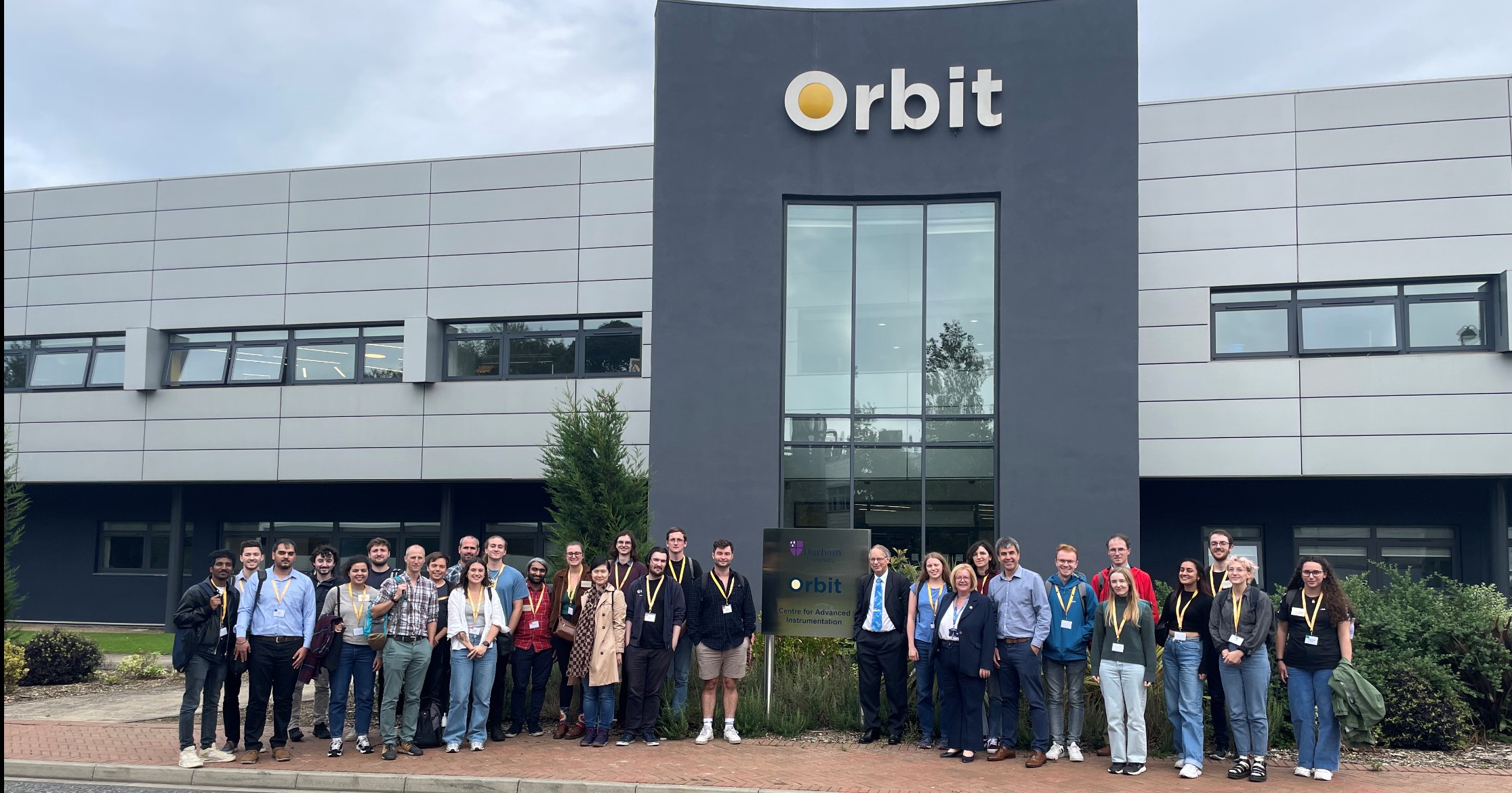
This week we hosted the STFC Space Technology Applications in Science and Industry Summer School at Durham University.
We were super impressed by our students from all over the country and our world-leading speakers and learnt a lot from both! The goal was to provide an overview of space activities in science and industry. We wanted to highlight opportunities but also to discuss the critical aspects of sustainability in space.
It has been a busy week!
We have been discussing the good and not so good side of space. Looking at designing space missions with European Space Agency - ESA (Giuseppe Racca), future space industry opportunities with the Satellite Applications Catapult (Mike Curtis-Rouse and Laura González Llamazares), Space Governance (Nikita Chiu, University of Exeter), Space Law (Christopher J. Newman, Northumbria University), Conflict and Collaboration (Andy Lawrence, The University of Edinburgh), Space Insurance (Mark Williamson, Space Technology Consultant), outreach and public engagement (4wardFutures) and space sustainability (Ralph "Dinz" Dinsley, 3S Northumbria).
We also made space to talk about resilience and mental health during post-graduate study and a careers panel session including Nikita Chiu (University of Exeter), Ariadna Calcines-Rosario (Durham University and Dan Rhodes, PMP Rhodes (Filtronic) exploring the pathways, differences and similarities of careers in academia and industry.
On Thursday we took a trip to Netpark and Orbit (thanks Sara Williams, David Allenson, Christina Munn!) to tour around some of our NE space businesses including Filtronic, aXenic, Raytheon NORSS and MAC SCITECH LIMITED).
I would like to say thank you to everyone involved for making it such a productive week!
We are now looking for sponsors for the next one - get in touch if you can help!
European Adaptive Optics Summer School
We are pleased to announce that registration is open for the 2023 European Adaptive Optics Summer School, which will be held virtually and aligned to European time zones. Topics will cover the basics of adaptive optics across applications in vision science, ophthalmology, astronomy, microscopy, free space optics and beyond. The programme includes live lectures and demonstrations and lab tours. The course will be delivered via Zoom by experts from across the different application areas of AO.

Early bird registration deadline (£75): Monday 8th May 2023 (midnight GMT)
We are also offering a number of free places as scholarships, you can apply via the registration form
For more details visit: https://aoschooleurope.sciencesconf.org/
To register visit: https://forms.office.com/e/RCMwCQJCHP
Organising committee
Laura Young - Newcastle University
Karen Hampson – University of Manchester
Qi Hu – University of Oxford
Martin Booth – University of Oxford
Adam Dubis – University College London
Enrique Josua Fernández – Universidad de Murcia
Caroline Kulcsár – Institut d’Optique
Pedro Mecê - Institut Langevin
Serge Meimon - ONERA
Tim Morris – Durham University
Benoit Neichel - Laboratoire d'Astrophysique de Marseille
James Osborn – Durham University
Kieran O'Brien – Durham University
Marinko Sarunic - University College London
CfAI at AO4ELT
Adaptive Optics for Extremely Large Telescopes (AO4ELT) is the largest conference in the field with 300 delegates from all over the world. CfAI researcher, Ryan Griffiths, has been offered a prestigious invited talk to present his work on the 24hour SHIMM, the world's first continuous optical turbulence monitor. In total there will be 6 presentations from CfAI staff, including Ali Bharmal, Aurelie Magniez, Ryan Griffiths, Sylvain Cetre, David Barr and Lisa Bardou.
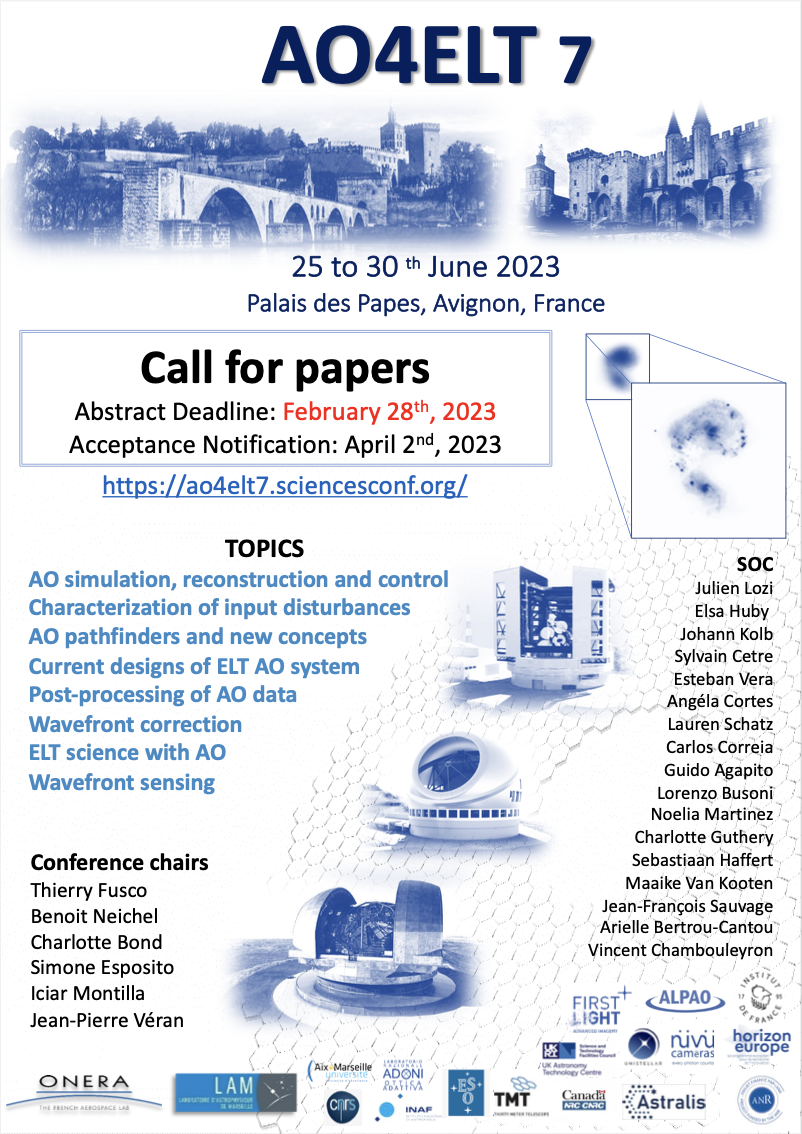
Freeform Optics Applications & Manufacturing for Astronomy & Space Missions
CfAI members will participate to a workshop in Chiang-Mai Thailand organised by NARIT on Freeform Optics between the 27th and 30th of May 2023. The workshop will focus on the manufacturing, metrology and various applications of these exotic surfaces in space and astronomical optical systems. Contact: cyril.bourgenot(at)durham.ac.uk.
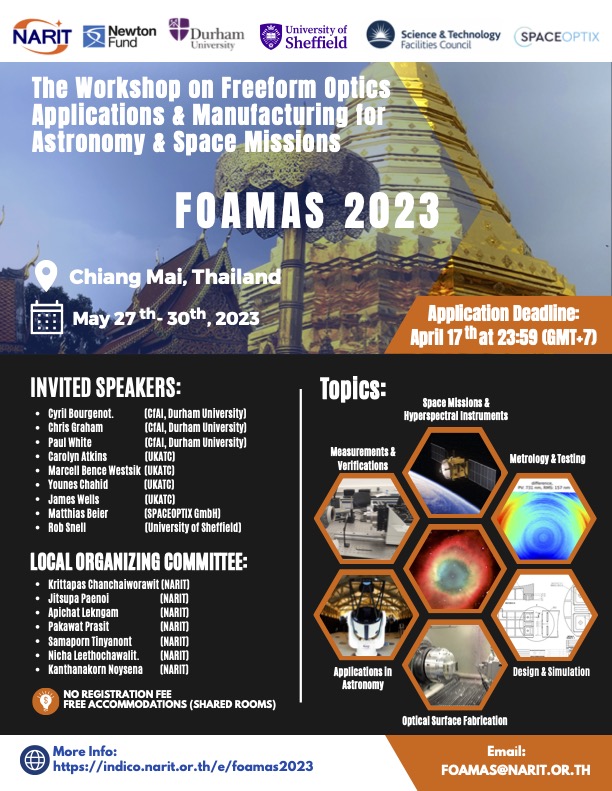
CfAI's Lily Westerby-Griffin and Fionagh Thomson explain astronomical instrumentation supported by Durham University Orchestral Society
Durham University Orchestral Society collaborated with the Durham University astronomer’s and instrument scientists in a performance of Holst’s The Planet Suites.
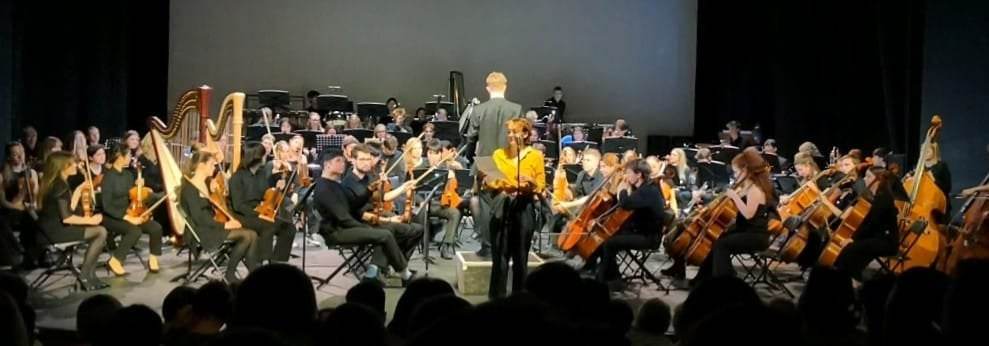
Ariadna Calcines
Young Female Scientist Talent of Spain 2022
Dr. Ariadna Calcines, senior optical engineer at CfAI, has received the Young Female Scientist Talent Prize 2022 awarded by the Royal Academy of Sciences of Spain (FRACE) in collaboration with Mastercard Spain. This prize is awarded to four female scientists under 45 who have made a significant contribution to sciences in Spain in four categories: Physics and Chemistry; Maths; applications of sciences to technology and Biology and Geology. She has received the prize in the category of applications of sciences to technology for the development of the image slicer technology for solar physics. The design of this technology is her main research line within CfAI applied to night-time and solar observations for ground-based and space telescopes.
Further information can be found in this link.
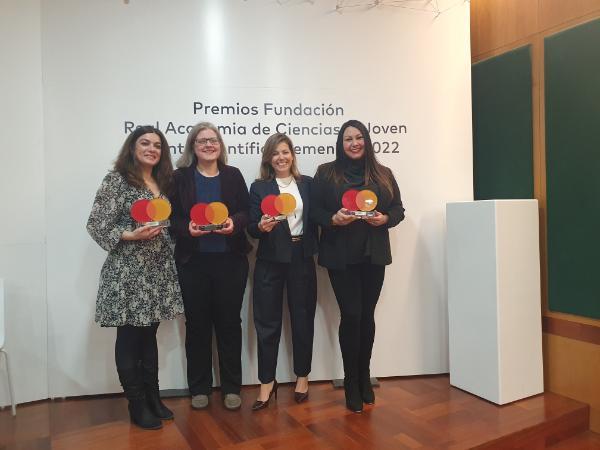
Dr Ariadna Calcines (far right) with fellow awardees
COAT 2023
Communications and Observations through Atmospheric Turbulence
A multidisciplinary workshop to address the biggest challenges in free-space optical propagation from astronomy to laser communications.
More information here.
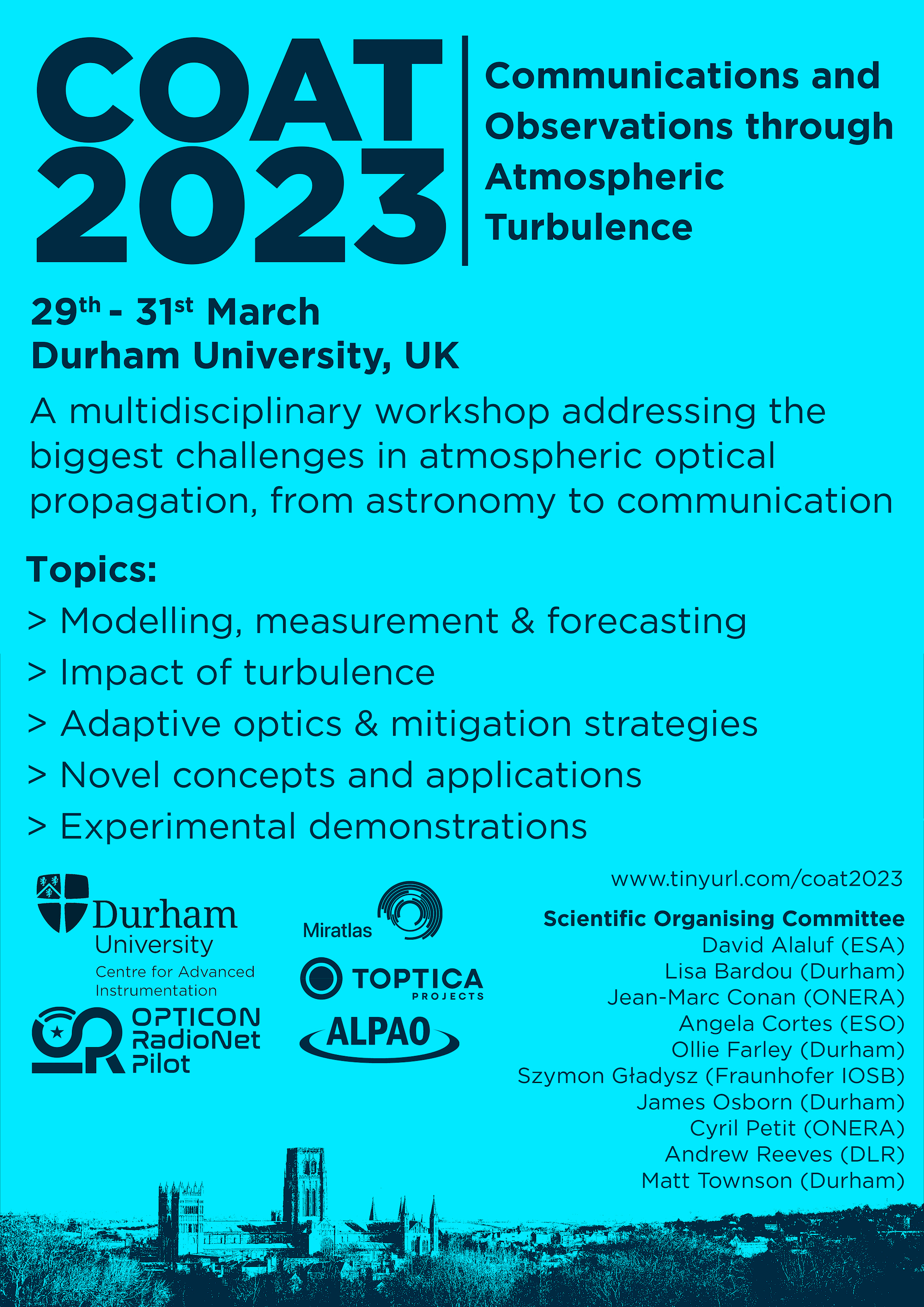
In a large variety of fields, the development of ever more demanding optical systems now requires a thorough understanding of the impact of atmospheric turbulence together with the development of dedicated mitigation strategies. Originally driven by astronomy, these issues now concern near ground imaging, satellite observation, ground-space and near ground optical free-space telecommunications and laser focusing.
The workshop aims at giving an overview of current research activities in this field. It will address turbulence impact and mitigation, especially in challenging environments such as strong turbulence, strong scintillation, high apparent wind speeds induced by target tracking, anisoplanatism effects due to the field of view or point-ahead angle.
The following topics will, therefore, be addressed during the workshop:
knowledge on turbulence conditions (modelling, characterization & prediction of both Cn² and wind profiles), including free atmosphere and local turbulence; study of system performance with and without mitigation; mitigation strategies based on innovative optical solutions such as single aperture adaptive optics, multi-aperture or aperture diversity solutions, integrated optics architectures, new wave-front sensing approaches, sensorless solutions, laser guide stars, high performance control; lastly, image/signal pre- and post-processing techniques (deconvolution, PSF prediction, digital communications techniques), novel reception schemes and advanced digital signal processing.
24 hour continuous turbulence monitoring at Paranal, Chile
Lisa Bardou and Ryan Griffiths carried out the first continuous optical turbulence monitoring at the European Southern Observatory site at Paranal, Chile.
The Shack Hartmann Image Motion Monitor (SHIMM) is the first instrument capable of measuring optical turbulence continuously day and night. This is important to support operations of optical astronomical telescopes. The night time measurements enable programme management and the daytime measurements enable continuous assimilation into turbulence forecast models.


/prod01/prodbucket01/media/durham-university/departments-/physics/cfai/CfAI-Webpage-Banner-smaller.jpg)

